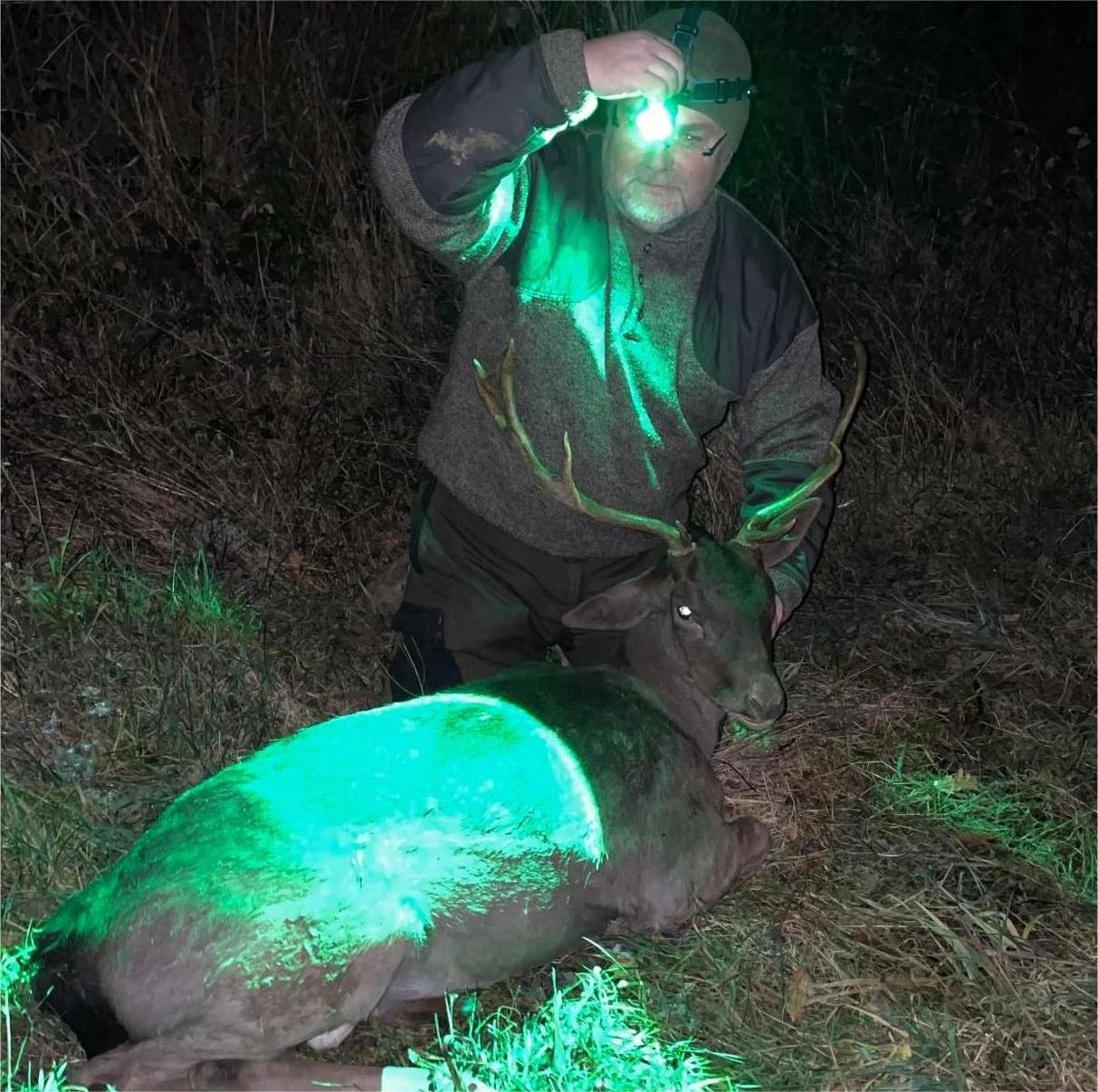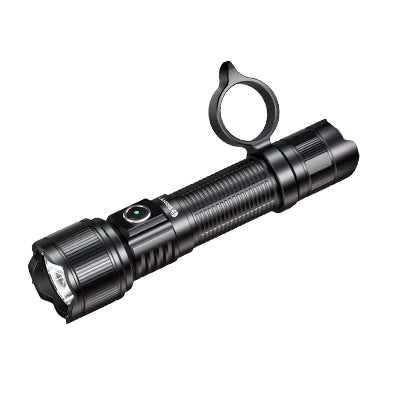Introduction: Why Beam Pattern Matters More Than Lumens in Hunting
When hunters shop for lighting gear, most focus on lumens—the bigger the number, the better it seems. But in real hunting environments, especially in Nordic forests, North American plains, and dense European woodlands, what truly defines whether a light helps or harms your hunt isn’t just brightness.
It’s the beam pattern—whether your light spreads wide like a floodlight or projects far like a throw light.
Understanding Floodlight vs Throw Light is key to choosing the right hunting headlamp or flashlight. The wrong beam can spook game, limit your visibility, or even get you disoriented in low-light terrain. Let’s break it down like a pro hunter would.

What Is a Floodlight Beam? (Wide Beam for Close-Range Hunting Awareness)
A floodlight beam spreads light over a wide area, illuminating your peripheral vision and immediate surroundings.
Best for:
- Tracking movement in dense woods
- Navigating Nordic forests and rough terrain
- Scanning ground for footprints, gear, or obstacles
- Setting up camp or moving quietly without flashing long beams
Ideal for:
Wide beam headlamps for hunting, area scanning, trail awareness, stealth movement
Example Scenario:
You're moving through thick pine forest in Norway. Your goal isn't spotting prey at 300 meters—it's not tripping over roots or alerting animals with a focused beam. This is where HL28 (flood mode) or HC01 red light flood becomes a hunter’s best ally.

What Is a Throw Light? (Narrow Beam for Long-Distance Target Spotting)
A throw beam focuses light into a tight, long-range hotspot, designed to identify game at distance without lighting up your entire surroundings.
Best for:
- Mountain or open-field hunting (T40 / T18 ideal)
- Spotting reflective eyes of animals at long range
- Rifle hunters scanning far ridges
- Signaling other hunters
Ideal for:
Long-range hunting flashlight, spotlight for hunting, tactical throw light with deep reflector
Example Scenario:
You're positioned on elevated terrain in Sweden, scanning beyond 200 meters. You don’t need a wide beam—you need concentration and reach. This is where T18 / T40 hunting throw lights outperform flood-only headlamps.
Floodlight vs Throw Light Comparison Table
| Feature | Floodlight Beam | Throw Light Beam |
|---|---|---|
| Beam Angle | Wide, spreads outward | Narrow, focused center beam |
| Visibility Range | Short to medium | Long-range precision |
| Best Terrain | Forests, trails, close tracking | Fields, hills, open hunting grounds |
| Hunting Style | Slow tracking, scanning ground, stealth movement | Long-distance spotting, precision target detection |
| Ideal Brinyte Gear | HL28 (flood mode), HC01 | T18 Artemis, T40 |

How to Choose the Right Beam Based on Hunting Style
| Hunting Scenario | Recommended Beam Pattern | Suggested Setup |
|---|---|---|
| Nordic forest tracking / tight woods | Flood beam | HL28 in flood mode / HC01 headlamp |
| Long-range spotting on open terrain | Throw beam | T18 / T40 handheld flashlight |
| Mixed terrain / flexible hunters | Hybrid adjustable beam | HL28 Artemis zoom function |
| Night approach where stealth matters | Red flood beam | HC01 with red light mode |
Quick Tip – If you're unsure, start with floodlight headlamp + throw flashlight. This is the setup many experienced Nordic and North American hunters rely on.
Brinyte Gear Matched to Real Hunting Scenarios
| Product | Beam Type | Best For |
| HL28 Artemis | Adjustable Flood + Throw Hybrid | Hunters who need both scanning and long-range beam control |
| HC01 Headlamp | Flood + Red Light Mode | Silent approach, map reading, tracking sign without alerting game |
| T18 Artemis | Deep Throw Light | Target spotting in open fields or ridge scanning |
| T40 | Extreme Throw + Hunting Lens System | Professional rifle hunters needing maximum beam concentration |
| PT28 / T28 | Tactical Mid-Range Throw | Backup light + flexible signaling gear |
Pro Setup: Why Many Hunters Carry Both Beam Types
Professional hunters don’t choose Floodlight vs Throw Light—They combine them.
Ideal Pairing Strategy:
- Use a headlamp in flood mode while moving or tracking
- Switch to a throw flashlight when scanning for game at distance
- Keep red or green mode ready to reduce animal alertness
This combo ensures maximum awareness + long-range control, covering all angles of Nordic and North American hunting terrain.

Suggested FAQ Section
1. What is the difference between floodlight and throw light for hunting?
Floodlight provides a wide beam that illuminates your surroundings, perfect for scanning and close-range hunting. Throw light produces a focused beam designed for long-distance spotting and tracking targets in open fields.
2. When should hunters use a floodlight instead of a long-range throw light?
A floodlight is ideal for tracking footprints, setting up camp, or navigating dense forest where wide illumination improves safety and awareness.
3. Is a throw light better for identifying game at long distances?
Yes. Long-range throw lights—like hunting flashlights with narrow beams—help hunters identify animal eyes and movement hundreds of meters away without lighting up the entire area.
4. Can I use one hunting flashlight for both flood and throw lighting?
Some advanced hunting lights, such as zoomable flashlights or dual-beam headlamps, allow users to switch between flood and throw modes, offering more flexibility in changing hunting environments.
5. Do different beam patterns affect stealth when hunting?
Yes. A narrow throw beam helps maintain stealth by directing light only where needed. Flood beams, if too bright, might reveal your position or alert game in open terrain.
6. What beam pattern is best for night hunting in forests or dense terrain?
A flood beam headlamp or wide-beam hunting flashlight is recommended in dense environments, allowing hunters to maintain awareness of their surroundings without missing movement from the sides.
7. Do professional hunters carry both floodlight and throw light gear?
Experienced hunters often carry both or choose hybrid models. A powerful throw light is used for scanning long-range targets, while a flood beam is essential for safe movement and close-up tasks.
Conclusion: Light Smart, Hunt Smart
When hunting in European woodlands, Nordic darkness, or North American fields, choosing the right beam pattern is more important than chasing lumen numbers.
-
Floodlight = Awareness. Throw Light = Precision.
- Smart hunters carry both.



